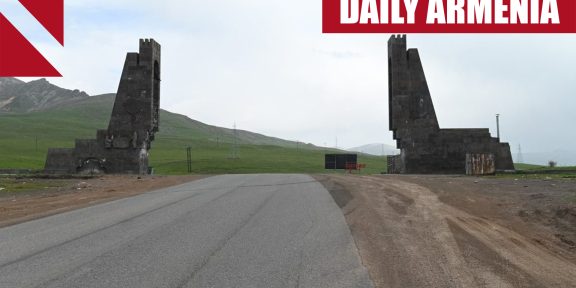Daron Acmeoglu, world renowned economist and author of Why Nations Fail delivered a talk over skype at a conference hosted by the University of Southern California Institute of Armenian Studies. The conference, entitled “END OF TRANSITION: Armenia 25 Years On. Now What?” was held in Los Angeles, on April 9.
***
…Armenia was much more outward looking and had the support of the Diaspora as a bridge to the western world, as a conduit of ideas and practices of democracy and the market economy, and connections to the export markets and technologies of the west. But it didn’t work.
What has gone wrong is not a simple thing that we can summarize in a single sentence. I think there were many turns and twists and some of it did not work out and some of it, I think, worked out badly for Armenia. But at a very high level, I think the biggest issue is that in the transition economies where the former communist elites were totally cast aside, transition worked much better. And in places like Russia, Uzbekistan or Kazakhstan where the communist elites controlled the process, things worked really badly.
And in Armenia, unfortunately, I think we are much closer to the second type of transition. And we have paid the price. So I think what could have been is that Armenia could have looked much more like the Czech Republic or Estonia and what we got instead is a country that looks much more like Azerbaijan or Uzbekistan, which is a real shame.
And what makes it even more depressing is that in some sense, in even some of the worst transitions like Kazakhstan, things have been getting better. Today Kazakhstan is very far from being a democratic country, but there are at least some movements toward strengthening institutions. Whereas in Armenia I think the beginning was stronger and it’s been getting worse and worse. And I have really come very close to losing all hope for Armenia in the last few years because the degree of corruption, the degree of political control of politicians that are really set on sort of closing the system rather than opening the system has been quite systematic. And the civil society organizations, which were very active early on and in the middle, have I think become tired because the opposition against them from the state has been so strong.
So I think it could have been great, and I’m still hoping that it’s not too late, but many hopes have been dashed.
What would have had to be different other than casting aside those old elites? What could have been different that was within the scope and ability, capacity, resources of the powers that ran Armenia, run Armenia?
There was a journalist in the first half of the 20th century in the United States who wrote a lot about corruption in the US cities, by the name of Lincoln Steffens. And his sort of motto was get the rascals out.
So his view was that if you want to clean up the cities, voters have to systematically vote out incumbents when the incumbents are corrupt, when the incumbents are not responsive, when the incumbents are doing things that are not in their interests. And I think that’s what’s happened in Armenia that has not gone Steffens’ way. That there have been many unsuccessful governments, but essentially for a variety of reasons, partly patronage, partly not enough civil society opposition to it, those governments haven’t been systematically voted out. And I think the future can only be brighter in Armenia if the democratic process works better.
What makes them democratic processes work?
I don’t think there is anything in the Armenian culture that I see as opposed or incompatible with democracy. So I don’t think that it’s culture. And I know that Armenia is in a very difficult geographic place. As neighbors, we have Turkey, Azerbaijan, Russia, and none of it is particularly conducive to a country that’s going to generate the sort of economic and political leap forward that we would like.
But I think at the end of the day, geography is not destiny in any shape. Certainly, the fact that Armenia has a difficult geography, mountainous access to transport networks and sea is difficult, I think those are disadvantages, but they are not insurmountable. We have Switzerland, which is the European version of Armenia and it has done very well.
We have Israel, which is surrounded by a series of hostile nations, intent on destroying Israel. And Israel is not perfect. It has many problematic features and institutions, but there’s also no debating that it is the most successful democracy in the entire Middle East. And it’s very advanced technologically and economically. So I think geographic factors are complicating factors for Armenia, but they’re certainly not the main culprits of where we should look for the problems. I think the problems are inside Armenia’s own political system.
And there, I definitely disagree with the culture sort of explanations, but it is true that practices persist and I think the way the Czech Republic or Poland was able to break away from the communist era was by strengthening the civil society movements, trade union movements, and protest movements that existed under the Soviet times, under the communist times. And build on them. Armenia did not have the same degree of civil society organization, which is of course harder when you are a part of the Soviet Union, but they developed shortly after transition. But they did not, they were not built upon and of course Armenia did not have the European Union to act as an anchor, to act as a model. It was supposed to have the Diaspora, but I think the effect of the Diaspora has been mixed in that first of all Diaspora has been a source of easy money for Armenia and easy money is really what breeds the worst kind of corruption in a weak institutional environment as Armenia’s.
The war with Azerbaijan and sort of the increasing tensions with Azerbaijan, coming and going all the time haven’t helped the political process also. But there are no two ways about it. I think we have to build on the same strengths that are crucial for the emergence of democracy everywhere. Civil society, freedom of press, organizations ranging from student organizations to trade unions, to professional business organizations and political parties that are free and are not just conceived as patronage machines. I think those need to sort of develop and the only way for them to develop is by political leadership and push from the bottom.
The examples you gave, Czech Republic, Israel, both of them benefited from hundreds of years of the Eastern European enlightenment, liberalization traditions. Where do we find that in Armenia?
Armenia has over 2,000 years of culture that also has a very enlightened aspect. Of course if you look back to Jewish culture, it has very enlightened parts and it has very non-enlightened parts. It’s the same with Armenia. I think it’s a question of which ones you pick and choose. Hungary was part of the most feudal part of the Austrian empire and it was very repressive, it had all the wrong sorts of things, but if you’re a Hungarian intellectual you can appeal to the better parts of the Austria-Hungarian heritage. So I think that is the, sort of part that’s crucial and you know again the environment is not to be dismissed. When you are locked into an existential struggle against Azerbaijan, you know, it’s much easier for politicians and perhaps parts of the public to bring up the more nationalistic, the more hostile elements of the traditions and the past rather than the ones that are more about openness and forward looking aspects of the country, and its thought and its heritage. But I think we have to keep on doing that.
We have seen throughout the Middle East and Central Asia how destructive, how dangerous the nationalist, war-based, aggressive rhetoric can be and I think there’s no reason for Armenia to succumb to that.
You have said that bad institutions are self-perpetuating.
They are.
And you have also said, and you just said it earlier today, that at the end of the day its civil society and bottom up. Except that in Armenia it can also be said that those civil society institutions themselves are either weak or, well let’s just call them weak.
I think we have used in some of our work, captured civil society. I think it’s easy to see how a weak civil society can be hostage to some political agendas, you know, especially nationalism plays that role of sort of taking the good out of the civil society and leaving the more aggressive elements on it and then it feeds on itself. So yes, I think those are real issues, that’s why I have become less optimistic about not just Armenia, but many places in the world, but Armenia in particular. So it’s not an easy struggle. But on the other hand, I meet many youth from Armenia, including some that are active in politics, and their outlook is always positive, at least the ones who come to the United States, who study at Harvard or MIT. And they want to do something in Armenia and at least when they are sitting in Cambridge or Boston, they are strongly opposed to corruption, to all the patrimonial and patronage-based practices. Now, you know, what happens to them when they actually go into politics in Armenia, I haven’t followed. But I think the values, the energy, the human capital are there. One advantage Armenia still has, which was a great advantage at the beginning of the transition that has been squandered, that it is pretty high in human capital you know compared to Uzbekistan, compared to Tajikistan. It has better human capital and access to the diaspora is one aspect to that capital. But again, that’s not what relations with diaspora have been used for so far.
You’re an economist, yet we’ve spent all this time talking about political systems. Is it possible to talk about Armenia’s economic development over these 25 years in isolation? Can we in fact spend a few minutes now and talk about its economic transition?
Yes, and I think the economy and the political systems are separate and they have their own differences, but a lot of my work has emphasized that we cannot separate them. The real potential of the economy can only be realized when the political relations in which it is situated permitted to go into more inclusive direction. Now there are aspects of the Armenian economy, and again they are related to some of the links with the Diaspora, that are still sort of able to stand up despite all the political problems because they are integrated into a different ecosystem, an ecosystem that’s outside Armenia’s. So you can be a good software developer in Armenia and work for some Diaspora related activity in Toronto or in Los Angeles, but that’s not enough for lifting the broad population of the country above essentially poverty which is where we are. So definitely there are some hopeful aspects of the economy and this is sort of the better side of the relations with the Diaspora, it’s the better side of the human capital that Armenia is able to generate itself and human capital that it has somehow inherited from the Soviet university system, which you know, wasn’t perfect but it had some technical strengths.
But to be able to build on them we just need more than just sort of a small sort of protected area, which sort of connects to the outside world, but is out of Armenia’s core economy. So for that, the political aspect is crucial and that’s why we’ve been focusing on it I think.
Finally, again within the economy sphere, is it fair to say that the areas that do excel are those that are post-Soviet sectors? Whether it’s tech, whether it’s medical tourism, banking, the financial sector generally.
Absolutely, and there is a good reason for that. Again, two reasons really. One is the Diaspora. I think those are the areas where the Diaspora made more natural investments. But the second is I think broader than that and it’s also related to the fact that, leaving tourism aside, those are also the sectors that have done better in post-Soviet Russia. And the reason for that is that the Russian state has left it alone. If you are in the oil business, if you are in the construction business, those are the cash cows for the Russian state and the Russian oligarchs, and the Russian security services. The same thing is true in Armenia. Whereas the tech sector essentially developed outside of the purview of the state and that’s why it has that dynamic. So if we improve the state, if we weaken the corruption incentives of the state, I think other sectors can go the same way.
If you have any concluding remarks, we would be happy to hear them.
I think we are in the middle of a very difficult transition process. In some level, the first half has been a failure, but I think there is no necessity cultural, historical, geographical that the second half should not be a success. The fact that the first half has been so difficult and not so successful means the handicapped is even greater. Good luck.
But possible.
But possible.















